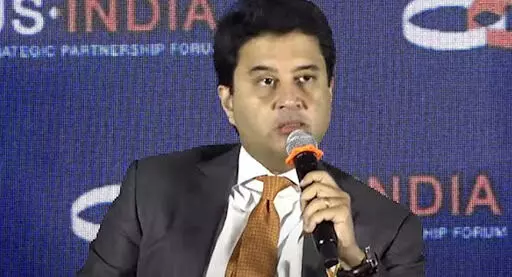Scindia: No Satellite Spectrum Auction
Scindia emphasised that the pricing structure would be determined by the Telecom Regulatory Authority of India.
Telecom Minister

India would allot spectrum for satellite broadband administratively rather than through an auction, communications minister Jyotiraditya Scindia clarified on Tuesday, despite calls from India's two largest telecoms for bids on spectrum rights.
Scindia stated, citing the Telecommunications Act 2023 and global practices, that satellite spectrum would be assigned administratively. He made it clear that the price structure would be determined by the Telecom Regulatory Authority of India (TRAI).
"Satellite spectrum around the world is assigned administratively. "India is not doing anything different than the rest of the world," Scindia stated. "If you do decide on auctioning, then you will be doing something that is different from the rest of the world."
The minister's comments come after Bharti Enterprises chairman Sunil Bharti Mittal argued for auctioning satellite spectrum in connected areas, which is similar to rival Jio's stance. This puts India's two largest telecom providers at odds with Elon Musk's Starlink, which supports an allocation rather than an auction.
While Mukesh Ambani's Jio has urged for all satcom spectrum to be auctioned, Mittal's position differs slightly. The chairperson of Bharti Airtel has stated that satcom providers targeting metropolitan regions and "elite retail customers" should follow the same standards as telecom companies, including spectrum auctions.
"Those satellite companies who have ambitions to come into urban areas, serving elite retail customers just need to take the telecom licences like everybody else, be bound to the same conditions," Mittal told reporters.
Mittal, on the other hand, advocated for administrative satellite spectrum distribution for carriers seeking to link remote, unserved areas.
In a statement after Mittal's remarks, Airtel said, "Satellite operators who want to provide services to urban areas and retail customers indeed need to go through the regular licensing process of any country, and in this case, India, to obtain a licence; buy the spectrum; undertake all the obligations, including rollout and security; pay their licence fees and taxes, and they would be welcomed by the telecom fraternity."
The Telecommunications Act requires satellite-based services such as global mobile personal communication by satellites (GMPCS) and very small aperture terminal (VSAT) communications to be assigned through an administrative process rather than an auction. However, the government has not yet implemented Section 4 of the act, which deals with spectrum assignment.
Musk responded to news of Jio's quest for spectrum auctions on Monday with a post on X, saying: "That (auctioning satellite spectrum) would be unprecedented, as this spectrum was long designated by the ITU as shared spectrum for satellites."
On September 27, TRAI issued a consultation paper titled "Terms and Conditions for the Assignment of Spectrum for Certain Satellite-Based Commercial Communication Services", with comments due by October 18. Jio responded by writing to TRAI chairman Anil Kumar Lahoti and then to Scindia, requesting changes to the paper.
"TRAI seems to have concluded, without any basis, that spectrum assignment should be administrative," Jio wrote in its letter to Scindia, according to Reuters.
Jio contended that satellite-based services and terrestrial networks no longer exist in mutually exclusive zones, resulting in an unequal playing field in interconnected areas where they compete.
Indian data should stay in local centres: Akash Ambani
Akash Ambani, chairman of Reliance Jio, advocated for data localisation at the World Telecommunication Standardisation Assembly (WTSA) and India Mobile Congress on Tuesday.
"The scale and speed of multilingual data generation in India, which will drive the AI revolution, will grow exponentially," Ambani told the press. "We request that the government expedite the update of the 2020 draft Data Centre Policy. "Indian data should remain in Indian data centres."
The draft national data centre policy, introduced in 2020, sought to encourage the building of data centres in India through single-window permissions. However, it has not been finished, and recent legislation has weakened data localisation standards. When asked about future re-examinations of data localisation policies, Scindia deferred to the IT ministry, stating that such choices are within their domain.

